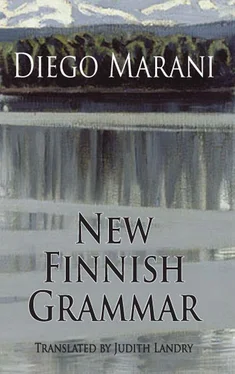‘So, do you sense the power, the truth that lies within this story?’ the pastor asked me as he poured the tea.
I took the cup from him, my hands still red with cold. I had grasped the bare bones of it even if much escaped me, above all those strange words, those fantastical objects whose shape the pastor outlined vainly with his hands: I had never seen anything like them. But I had been captivated by seeing the sounds forming themselves in his mouth, to be turned into words, then melt away. When I could not understand them, I listened to them like music, a fascinated witness to their fleeting life. How many words were needed to bring a man to life!
Meanwhile, a smoke-laden warmth had built up in the church. Hanging above the stove, Koskela’s overcoat and my jacket were drying, giving out a smell of naphtha. Without caring whether I was following or not, the pastor had begun to speak again.
‘When you can read the Kalevala you will be a real Finn; when you can feel the rhythm of its songs, your hair will stand on end and you will truly be one of us! Look!’ he added, opening the black leatherbound volume on the table. ‘These are not just words! This is a revealed cosmogony, the mathematics that holds the created world in place! Ours is a logarithmic grammar: the more you chase after it, the more it escapes you down endless corridors of numbers, all alike yet subtly different, like the fugues of Bach! Finnish syntax is thorny but delicate: instead of starting from the centre of things, it surrounds and envelops them from without. As a result, the Finnish sentence is like a cocoon, impenetrable, closed in upon itself; here meaning ripens slowly and then, when ripe, flies off, bright and elusive, leaving those who are not familiar with our language with the feeling that they have failed to understand what has been said. For this reason, when foreigners listen to a Finn speaking, they always have the sense that something is flying out of his mouth: the words fan out and lightly close in again; they hover in the air and then dissolve. It is pointless to try and capture them, because their meaning is in their flight: it is this that you must catch, using your eyes and ears. Hands are no help. This is one of the loveliest things about the Finnish language!’
Koskela would intersperse his speeches with long pauses, during which he would become suddenly motionless, as though entranced by his own train of thought. This gave me time to gather up such scattered remnants as I had managed to grasp and put them down on paper. Sipping my tea, I would leaf through the pages of the Kalevala , seeking out the words which I did not know but which I had heard in his account, so that I could ask him about them. I would also linger on the images. I noticed that the signs that gave physical shape to that ancient language seemed to have something in common with the characters described: drawn in Indian ink so that they looked almost three-dimensional, the tousle-headed heroes had nothing with which to express themselves except the words that lay around them: solid and dense, these words marched across the page in geometrical, almost military order, reinforced by the alternating rhyme schemes. I did not read the rhyme, rather I saw it, like reassuring embroidery made of the same three letters, bonding the lines together like an iron nail.
My own personal knowledge of our national epic has enabled me to reconstruct some illegible parts of the preceding text. The author was probably copying out sentences dictated by the pastor during his lessons: clearly, in his excitement, Koskela must have been speaking too fast for his still inexpert pupil to take them down in their entirety. As to Koskela’s dense reflections on language, here and elsewhere, I have been able to reconstruct them thanks to the substantial notes written on the back of the illustrations in his copy of the Kalevala, which I came across together with this manuscript. In an envelope glued into the jacket flap, along with sacred images and old Russian stamps, I also found various theological writings, indeed virtual dissertations, by the pastor which I incorporated into the manuscript where I felt that the author’s notes seemed to be referring to them. I too would have liked to have known the Army Chaplain Olof Koskela, and to have talked with him of the Kalevala and of God. His reflections often surprised me: if in some places I recognized the signs of his religious training, others were marked by an open-mindedness rare in a Lutheran Pastor. I do not know how old he was, but judging by the date of his edition of the Kalevala I inferred that he was just a little younger than my father; so that I cannot help wondering which side he was on during the civil war. His dislike for the Russians is only part of the story. Perhaps Olof Koskela was indeed a shaman; certainly he was one of the few remaining free spirits in this country at the time.
The pages which follow reproduce a series of dialogues; they are among the most indecipherable in the manuscript, full of crossings out, spelling mistakes and words in the wrong case. Sometimes it is not even clear who is speaking, and the responses are often incomplete, full of blank spaces. Clearly, this part of the manuscript was never corrected by the pastor, and I have been able to fill in the blanks with help from Miss Ilma Koivisto, indeed it was she who transcribed them. It was she who reconstructed the author’s descriptions of the landscape, and other of his thoughts. In the manuscript text the digressions which introduce and follow the dialogues are only roughly sketched in, barely hinted at by fragments of sentences, single words, heavily rewritten or underlined. Like buoys on the ocean of the page, they pointed me towards the flotsam and jetsam of conversations I had had with the author on board the Tübingen in the autumn of 1943. In this way, encrusted now with shells and overlaid with seaweed, the thoughts of which I am once more taking possession do indeed belong to me.
It was snowing heavily as I left the hospital, one evening in late March. Walking as fast as I could along the Esplanadi, I heard what I thought was the sound of a piano playing, borne on a gust of wind, coming from the Kämp. Opening the door, I was met by the welcoming sight of a choir of uniformed nurses, standing before an audience that was, for once, quietly attentive. Shaking the snow from my coat, I too joined the crowd, taking my place in one of the back rows. The room was brighter than usual; there were lamps on the tables I’d never seen before, and various ornamental plants had been laid out at the foot of the little dais, itself covered with a red cloth bearing the emblem of the Lotta-Svärd . The piano had been moved into the middle of the room, and was being played by an officer from the frontier guards, who was wearing a uniform which was too big for him. The occupants of the front rows were mainly officers in regimentals, and ambassadors in tails; behind them sat the journalists, together with a group of soldiers wearing dark grey uniforms, with badges which I did not recognize, their chapped faces suggesting that they had just returned from the front. It was beside one of these that I had seated myself; he was listening to the choir as one hears mass, with his head bowed and his hands placed firmly on his knees. The red mark of a scar was visible on the nape of his neck, amidst the close-cropped hair. The heavy fabric of his uniform gave out a smell of disinfectant which reminded me of the piles of blankets in the laundry, laced with a scent of soap; his boots and belt smelled of recently applied polish. The waiters were handing round some warm drink which was very strong; I took a glass from every tray that came around, and it was not long before I was well and truly drunk, glowing with alcoholic warmth, which somewhat lifted my dark mood. In the crammed lobby, the show went on; the silence preceding each number became increasingly tense and grave; so still was the room that you could hear the trees on the Esplanadi rustling in the wind. The voices of the nurses rang out with a mellow softness which was quite unlike the martial tones that I was used to hearing; they rose beguilingly in harmonic scales, then dropped again in geometric spirals. Yet for some reason their songs seemed to inspire the audience with the patriotic fervour normally aroused by a military march. The final song left the soldiers around me positively incandescent, and they burst into applause where joy and fear mingled in equal measure. It was not one of the gentle popular tunes they had been singing previously, but a march which everybody knew. I myself had also heard it somewhere, I could not remember where. At the first notes, one soldier tossed his cap into the air, others turned to hug each other, shouting words I could not understand; then, to a man, they rose to their feet, took one another by the shoulder and added their own deep voices to those of the choir. It was then that I recognized the march: suddenly I remembered the night of the bonfires, the icy road and my unknown companions singing in the dark. Perhaps they were indeed the very same men: I had seen nothing of them but the glowing tips of their cigarettes in the chill darkness. Now I realized that the smells too were familiar: koskenkorva , tobacco, sweat. Although I did not know the words, I too began moving my lips in imitation of the man next to me; I too applauded and thrust myself forward into the crowd which had formed around the soldiers, some of whom were weeping. The nurses on the dais were visibly moved, and had fallen silent, to listen to the soldiers; they looked hot and tired, yet quite composed. They remained in their rows, hands clasped, feet neatly together. Once the soldiers had fallen silent and the applause had finally died down, the usual atmosphere returned. As people filed slowly out, pulling on their overcoats, the waiters replaced the chairs around the tables and pushed the armchairs back into place beside the windows. After exchanging handshakes and military salutes, the soldiers too picked up their greatcoats and left the room. I saw them climb on to a military lorry, its headlights lighting up the whole room as it executed a turn in front of the hotel. The soldiers in regimentals, and the ambassadors, disappeared into the waiting limousines and drove away. Seated at the tables in the back of the room, the journalists had resumed their usual prattle about military strategy; one or two were at the bar, finishing their beer. The usual little glasses for koskenkorva now reappeared, together with the ashtrays. Several nurses had stayed behind and were now sitting with a couple of officers at a table a little to one side, where tea and cakes were being served, rather than koskenkorva ; they were talking quietly and gathering the crumbs up from the tablecloth.
Читать дальше












